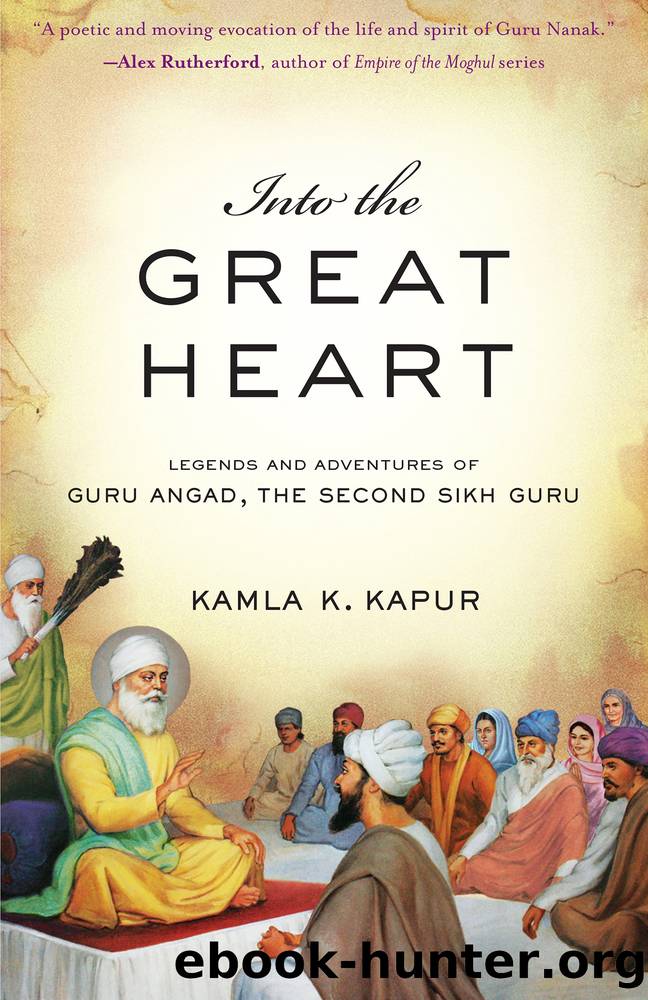Into the Great Heart by Kamla Kapur

Author:Kamla Kapur
Language: eng
Format: epub
Publisher: Mandala Publishing
Published: 2020-04-28T00:00:00+00:00
102. Curried lentils.
103. Good fortune! Good fortune!
104. Kaka is a generic name for young boys in Punjabi.
105. A pancake-like flat bread made of corn.
106. A Punjabi dish made with mustard leaves, ghee, and cream.
107. Homemade cottage cheese.
108. Sung at the beginning of a raag, an improvised, slow, arhythmic exposition of the raag in Indian classical music.
PART II INTO THE GREAT HEART
CHAPTER 17 Dialogue in Kartarpur
Time, the river that is always coming toward us, moving away, and remaining, flowed inexorably on in Kartarpur, changed its course, often subtly, sometimes violently and suddenly. Years passed, as they always do, in the blink of an eye. People grew up, married, moved away, died, even as new birth carried ceaselessly on. During the course of many monsoons and dry spells, the River Ravi, in its ceaseless journey and thrust to lose its identity in the sea, carried away the debris of houses, trees, corpses … without being burdened or sorrowed by any of it. The seasons, too, spun out with the turning of the earth, like a spindle or a lathe, recurred, stayed, moved inevitably on, and, just as inevitably, returned. It all happened imperceptibly, beyond the comprehension of eyes, like the rhythm of the day, from the first ray of light to its blooming into noon, its decline and muting into the glow of dusk, then disappearance into the folds of darkness, the stars, the planets, and the moon wheeling silently, ever silently, into day again.
It is yet another spring in Kartarpur. The forests around the habitation are alive with color and life. The wild acacias and Gulmohar109 bloom in shades of pinks, purples, yellows, and blues; fragrant lotuses and hyacinths flower in the ponds and marshes; peacocks with their thousand-eyed feathers; cuckoos, doves, larks, thrushes, hawks call and cry; bees buzz and hum gathering nectar, and in the abundant grass thick and lush with winter rains, the young of monkeys, tigers and deer, snakes and rabbits, and all the varied life on Earth, water, and air cavorts and hunts with new life.
It is Trinjan110 day in Kartarpur in the spring of 1612, and excitement is in the air. It is held only once a month, the day of the full moon. Though the women are eager to meet more frequently, it is impossible for them to make time from their household routines. They are grateful to have it at all, considering the resistance the idea had received from the men.
Their opposition carried on for years before Baba, with the help of Nanaki and Sulakhni, negotiated an agreement during one particular meeting between the women and men who thought of it as a “waste of time.” This meeting, which took place in the spring of 1611, needs to be described before we go on to Trinjan day.
In an evening session of music, Baba sang many shabads on the equality of men and women to soften the men to receive his message. Naaree purakh sabaa-ee lo-ay, he sang: “The same Light shines in women and men;” “Naar na purakh kahhu ko-oo kaisay: neither male nor female, how shall I describe this Being?” he sang of his Beloved.
Download
This site does not store any files on its server. We only index and link to content provided by other sites. Please contact the content providers to delete copyright contents if any and email us, we'll remove relevant links or contents immediately.
Becoming Supernatural by Dr. Joe Dispenza(7105)
Tools of Titans by Timothy Ferriss(6945)
The Witchcraft of Salem Village by Shirley Jackson(6584)
Inner Engineering: A Yogi's Guide to Joy by Sadhguru(5894)
The Four Agreements by Don Miguel Ruiz(5510)
The Power of Now: A Guide to Spiritual Enlightenment by Eckhart Tolle(4754)
The Wisdom of Sundays by Oprah Winfrey(4626)
Room 212 by Kate Stewart(4105)
Fear by Osho(4085)
Pale Blue Dot by Carl Sagan(4001)
The David Icke Guide to the Global Conspiracy (and how to end it) by David Icke(3881)
Rising Strong by Brene Brown(3780)
Animal Frequency by Melissa Alvarez(3755)
How to Change Your Mind by Michael Pollan(3676)
Sigil Witchery by Laura Tempest Zakroff(3651)
Real Magic by Dean Radin PhD(3568)
Secrets of Antigravity Propulsion: Tesla, UFOs, and Classified Aerospace Technology by Ph.D. Paul A. Laviolette(3445)
The Art of Happiness by The Dalai Lama(3382)
Man and His Symbols by Carl Gustav Jung(3315)
